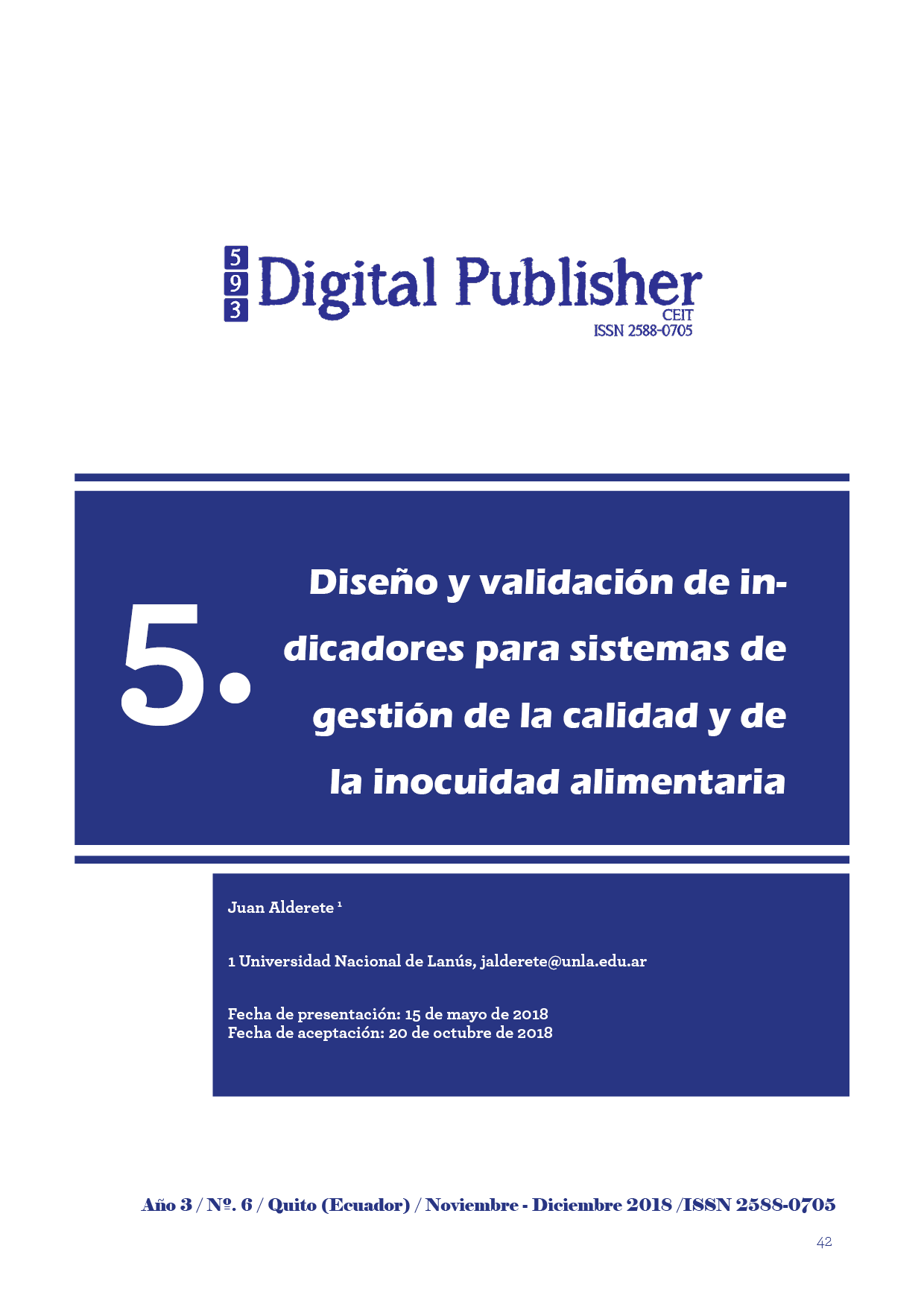Diseño y validación de indicadores para sistemas de gestión de la calidad y de la inocuidad alimentaria
Main Article Content
Abstract
The objective of the work carried out was to design and validate the quality indicators that the former Ministry of Agriculture, Livestock and Fisheries (MAGyP) would use to measure the degree of implementation of quality systems in groups of producers / food processors. Up to the moment in which this project was addressed, MAGyP used several types of indicators to measure the degree of implementation, which lacked any type of technical validation.
For this, it was proceeded to determine by means of surveys the situations ex - ante and ex - post to the tasks of implementation divided in three big headings: Investment, Training and Documentation and registries. The designed system is based on the random sample survey, whose size is equivalent to the square root of the total beneficiaries of the project under analysis. The validation of the proposed methodology consisted in comparing the results of the samples with those of the total of beneficiaries.
This resulted in sample and population results that were compared directly and in graphic form, studying in particular seven geographically and productively diverse projects: "Implementation of Good Manufacturing Practices (GMP) for the application of the Denomination of Origin (DO) of the cheese of Tafí del Valle of the province of Tucumán "," Implementation of quality standards in 10 packing and / or refrigeration establishments of fresh fruits (apples and pears) located in the Alto Valle area, Río Negro province "," Diagnosis and implementation of Good Agricultural Practices (GAP) and Good Manufacturing Practices (GMP) in producers and processors of fine fruits of the Province of Neuquén "," Diagnosis and implementation of quality management systems in the milk production of the Province of Tucumán", "Diagnosis and implementation of quality management systems in swine production cumana "," Diagnosis and implementation of good manufacturing practices in fine fruit processing establishments of the Patagonian Andean region of the 42nd parallel", and" Implementation of Good Agricultural Practices (GAP) to 15 walnut-producing establishments located in the Province of Catamarca ".
The comparison between population and sample results in the situations before and after each implementation, gave practically equivalent results, for which the proposed methodology is considered validated, which allowed its use in the more than 200 in force at the time of completion of the study.
Downloads
Article Details
1. Derechos de autor
Las obras que se publican en 593 Digital Publisher CEIT están sujetas a los siguientes términos:
1.1. 593 Digital Publisher CEIT, conserva los derechos patrimoniales (copyright) de las obras publicadas, favorece y permite la reutilización de las mismas bajo la licencia Licencia Creative Commons 4.0 de Reconocimiento-NoComercial-CompartirIgual 4.0, por lo cual se pueden copiar, usar, difundir, transmitir y exponer públicamente, siempre que:
1.1.a. Se cite la autoría y fuente original de su publicación (revista, editorial, URL).
1.1.b. No se usen para fines comerciales u onerosos.
1.1.c. Se mencione la existencia y especificaciones de esta licencia de uso.
References
Beske, P., Land, A., & Seuring, S. (2014). Sustainable supply chain management practices and dynamic capabilities in the food industry: A critical analysis of the literature. International Journal of Production Economics, 152, 131-143.
González, O., & Arciniegas, J. (2016). Sistemas de gestión de calidad. Ecoe Ediciones.
González González, A., & González Rodríguez, R. A. (2008). Diseño de un sistema de gestión de la calidad con un enfoque de Ingeniería de la calidad. Ingeniería Industrial, 29(3).
Loor Moyano, J., & Schnabel Chica, S. (2016). El conocimiento de las buenas prácticas agrícolas y su influencia como factor de calidad en la agro exportación en los productores de cacao en la parroquia Junquillal del Cantón Salitre Provincia del Guayas, periodo 2015-2016 (Bachelor's thesis, Universidad de Guayaquil. Facultad de Filosofía, Letras y Ciencias de la Educación.).
Padilla, R. (2014). Fortalecimiento de las cadenas de valor como instrumento de la política Industrial: Metodología y experiencia de la CEPAL en Centroamérica. CEPAL.

